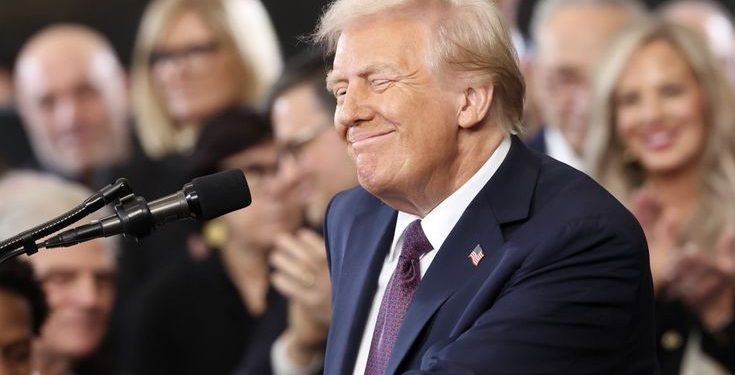U.S. President Donald Trump has announced a new tariff policy that imposes a blanket 10% duty on all imports, with specific countries facing even higher rates. Among those affected is Nigeria, which will now be subjected to a 14% tariff on its exports to the United States.
According to 2023 data from the Observatory of Economic Complexity (OEC), Nigeria exported goods worth $6.29 billion to the United States. Nigeria main stream of money came from the crude petroleum which was valued at $4.73 billion, petroleum gas at $920 million, and nitrogenous fertilizers amounting to $167 million. Over the past five years, Nigeria’s exports to the U.S. have grown at an annual rate of 1.59 percent, rising from $5.81 billion in 2018 to $6.29 billion in 2023.
The tariffs, which mark one of the most aggressive trade policies in recent history, aim to address what the Trump administration considers unfair trade practices and imbalances. While China has been hit with a 34% tariff, Japan 24%, and the European Union 20%, Nigeria’s inclusion at 14% has raised concerns about its economic implications.
According to the White House, the decision is based on a review of trade relationships, with countries that maintain trade barriers against U.S. products being penalized under the new system. The administration insists the move is necessary to create a fairer playing field for American industries, arguing that the U.S. has suffered from decades of unfavorable trade policies.
The global response has been immediate, with financial markets experiencing significant volatility. U.S. stock indices, including the S&P 500, Dow Jones, and Nasdaq, all recorded sharp declines, with losses ranging between 2.8% and 3.8%. International markets also reacted negatively, reflecting widespread concerns over the potential for a full-scale trade war.
For Nigeria, the impact of these tariffs could be substantial. The country has historically enjoyed a trade surplus with the United States, exporting goods worth approximately $5.29 billion while importing around $3.88 billion. A large portion of these exports consists of crude oil, a sector that could be significantly affected by the higher tariff rate.
Economic analysts believe the new policy could reduce Nigeria’s export competitiveness in the U.S. market, making its products more expensive and less attractive to buyers. This move may also force Nigeria to accelerate efforts toward economic diversification, shifting focus from crude oil to other industries such as agriculture, manufacturing, and technology.
The Nigerian government is expected to engage in diplomatic efforts to seek exemptions or reductions in these tariffs. Trade experts suggest that negotiations highlighting Nigeria’s role as a strategic partner in Africa, as well as its strong business ties with the U.S., could potentially lead to more favorable terms.
At the same time, the development underscores the need for Nigeria to strengthen its trade relationships within Africa. With the African Continental Free Trade Area (AfCFTA) already in place, Nigerian businesses may look toward expanding into regional markets as an alternative to U.S. trade.
While the full impact of Trump’s new tariffs is yet to be seen, the policy marks a turning point in global trade relations. For Nigeria, the coming months will be crucial in determining how the country adapts to these changes and what strategies it adopts to mitigate economic risks. The challenge now is for policymakers and business leaders to navigate this new trade landscape and find opportunities amidst the disruption.

























































